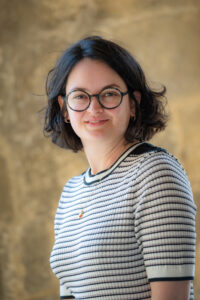„Příliš hlučná svoboda: nástup filmové Nové vlny v komunistickém Československu (1956-1968)”
Výzkumná osa 1: Přemístění, vykořenění, odchýlení: lidé, vědění, praktiky
 My thesis focuses on the Czechoslovak New Wave and its relationship with the historical and political context of the sixties in Czechoslovakia. I intend to analyse the factors which led to the emergence of inventive ‘auteur films’, often critical of or offering a counter-point view to the ideal image of the society promoted by the regime in a studio-system, while the production was controlled and ideologically censored by multiple institutions. The film industry was nationalised in 1945 in Czechoslovakia, a decision which facilitated the control of the cinematography by the Communist Party after the coup d’état of 1948. Not only did the cinema become an ideological tool but it was also the theatre of political fights between influential members of the Party. After a decade of control, where the ‘socialist realism’ doctrine was established into all artistic fields, leading to a standardisation of the production, a discreet Thaw started at the end of the 1950s when the powerful (and Stalinist) Minister of Culture Václav Kopecký was ousted. But the true artistic rupture in the film aesthetic appeared at the of the 1960s, when a new generation of directors, inspired by the post-war Neorealism aesthetic and Direct Cinema techniques, started to film the society of its time. Czechoslovakia began to be recognised at international film festivals, in Mannheim Festival in 1963 where Věra Chytilová won the main prize for Something Different (O něčem jiném) and in Locarno Festival in 1964 where Miloš Forman won the Golden Leopard for Black Peter (Černý Petr).
My thesis focuses on the Czechoslovak New Wave and its relationship with the historical and political context of the sixties in Czechoslovakia. I intend to analyse the factors which led to the emergence of inventive ‘auteur films’, often critical of or offering a counter-point view to the ideal image of the society promoted by the regime in a studio-system, while the production was controlled and ideologically censored by multiple institutions. The film industry was nationalised in 1945 in Czechoslovakia, a decision which facilitated the control of the cinematography by the Communist Party after the coup d’état of 1948. Not only did the cinema become an ideological tool but it was also the theatre of political fights between influential members of the Party. After a decade of control, where the ‘socialist realism’ doctrine was established into all artistic fields, leading to a standardisation of the production, a discreet Thaw started at the end of the 1950s when the powerful (and Stalinist) Minister of Culture Václav Kopecký was ousted. But the true artistic rupture in the film aesthetic appeared at the of the 1960s, when a new generation of directors, inspired by the post-war Neorealism aesthetic and Direct Cinema techniques, started to film the society of its time. Czechoslovakia began to be recognised at international film festivals, in Mannheim Festival in 1963 where Věra Chytilová won the main prize for Something Different (O něčem jiném) and in Locarno Festival in 1964 where Miloš Forman won the Golden Leopard for Black Peter (Černý Petr).
My thesis project offers a detailed and informed study of the cinematographic movement known as the Czechoslovak New Wave in a historiographical, sociocultural, and aesthetic perspective. I expect to build an economic, technical, and aesthetic modelling of this movement, in line with what was elaborated for the French New Wave in particular by Michel Marie, by digging into the context and the interaction, during the production and the exhibition between the films and the society where they were produced in.
I rely on the methods of the historical field, in particular the collection and criticism of documents (film or non-film), as well as on the tools of cultural history, which invites us to place cultural objects in a social history. I study films of my corpus with a contextual analysis, reconstituted with various archives: press of the time (general or specialised), production documents from the studios, personal archives from witnesses (directors, writers, actors, politicians…), institutional documents and documents from the
aftermaths (memoirs, press report…). Inspired by other works and by a lecture taught at Université Paris Cité for bachelor degrees on ‘Cinema and sociology’, I extended my approach to sociology of culture, with an interest for the film workers ecosystem, especially in the framework of the Filmové Studio Barrandov, and how it influenced the production of films.
